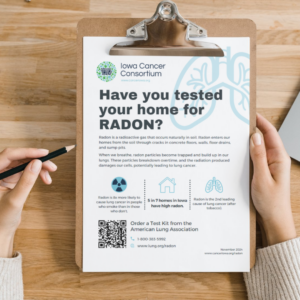Radon in Iowa
Radon is an invisible, tasteless, odorless, radioactive gas that is naturally produced by radium and uranium in the soil. Radon becomes harmful when it becomes trapped and concentrated in the air. For example, when it leaks into a basement through a crack in the foundation or a space around a pipe.
Radon exposure is the leading cause of lung cancer among people who have never smoked. And for people who have smoked, the EPA estimates that radon exposure can increase their risk of lung cancer by 10x. (source)
Lung cancer caused by radon exposure results in 21,000 deaths per year, including 400 deaths annually in Iowa.
Iowa has the largest percentage of homes (71.6%) at or above the EPA’s action level of 4 picocuries per liter (pCi/L) (source). In fact, the average radon level in Iowa homes is 8.5 pCi/L, compared to an overall United States average of 1.3 pCi/L.
Testing for radon is easy, and mitigating high radon levels is more affordable than the cost of lung cancer. Several county public health departments offer free or low-cost radon test kits – check with your local public health department to learn more. You can also purchase radon test kits at your local hardware store or through the American Lung Association, below.
Order a radon test kit from the American Lung Association or call the Iowa Radon Hotline at 1-800-383-5992.
If your home’s levels are at or above 4 pCi/L, contact a Radon Mitigation Specialist certified by the State of Iowa. The Iowa Department of Health and Human Services regulates this certification and has an updated list of certified Radon Mitigation Specialists here.
Radon mitigation payment options can include a no-interest loan from your bank or credit union, a payment plan with the mitigation company, or reimbursement from your flexible spending account (FSA), health savings account (HSA) or a health reimbursement arrangement (HRA). Several Iowa counties and cities have financial assistance programs for radon mitigation (PDF).
Download the “Have you tested your home for radon?” flyer (PDF)
If you’d like to learn more about the Iowa Cancer Consortium, including our Radon Workgroup, please email [email protected].
Resources:
- American Lung Association – Radon in Iowa
- Breathing Easier – A resource for physicians
- Energy Association of Iowa Schools
- Environmental Protection Agency – Radon
- Iowa Cancer Plan, Chapter 2, Priority #7
- Iowa Department of Health and Human Services – Radon
Related Posts from the Iowa Cancer Consortium:
- Clearing the Air: Radon Myths & Facts
- Legislation to Save Lives: Gail Orcutt Radon School Safety Act
- Radon & Rentals: Iowa City First in the State to Require Radon Testing & Mitigation in Rental Homes
- Radon Action Month: Do You Know Your Home’s Levels?
- COVID-19 Doesn’t Stop School Radon Teams
- Mourning the Passing of Gail Orcutt
- Radon-Induced Lung Cancer: Gail’s Journey

